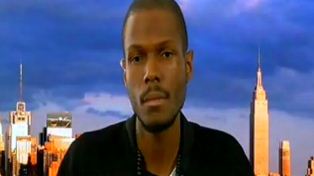
Cartagena, April 17: Malcolm X's grandson, El-Hajj Malik El-Shabazz, says that Blacks are murdered with impunity in the United States because the system is unjust, Press TV reports.
In an exclusive interview with Press TV on Monday, Shabazz commented on the murder of Black teenager Trayvon Martin, saying, “There are hundreds of Black Americans who are being murdered in the United States every year with impunity. And police officers serve no time. They always get off.”
Shabazz said this occurs because there is institutionalized racism in the United States.
“The United States has more people incarcerated than anywhere else in the world. It has more people incarcerated than China, and China has the most people in the world,” he noted.
Shabazz stated that although a minority of the people of the United States are Black, in prisons the majority of the people are Black and Hispanic. “And in these institutions people are forced to work for pennies on a dollar.”
And according to the US Constitution, slavery has been abolished, except for people who are serving time in penal institutions, Shabazz noted.
Elsewhere in his remarks, he said that as long as there are upper, middle, and lower classes in the United States, slavery will exist.
Shabazz also asserted that the US president is a puppet, and a small group of people control everything in the United States.
He went on to say, "My grandfather once equated revolution to a forest fire. And he stated that the goal of the revolution was that like a forest fire… that ravishes the forest completely. He said that is the goal of the revolution.”
“We should take down the system completely, and set up a new system of our own, which is more just,” he added.
If the system is not taken down completely, people of color will always remain on the bottom socioeconomic strata of the United States, he observed.
Commenting on the 9/11 terrorist attacks, Shabazz said Muslims were not the culprits.
“Muslims didn't do 9/11. They had nothing to do with 9/11,” he stated.
He added, “If you make research you'll see everything that was utilized in 9/11 pointed back to the United States --- the flight training, the visas, the planes they used, everything came from the United States.
“Muslims cannot take such action against civilians. And anybody who would take such actions against civilians is not a Muslim.
“And the people who were involved in 9/11 were agents of the United States, the CIA or whatever other three letter organizations they have in this country.”
In an apparent reference to the concept of leaderless resistance, he said, “If I can't identify an essential leadership or a governing body, I have a problem with that.”
He also expressed doubt about the authenticity of the Occupy movement in the United States and uprisings in Egypt, Tunisia, Libya, and Syria.
“My grandfather once stated that you should never join a movement unless you are completely aware what that movement is about because a lot of the time we have outside forces that orchestrate those movements and get us to do things which we would not ordinarily do,” he stated.





Comments
Add new comment